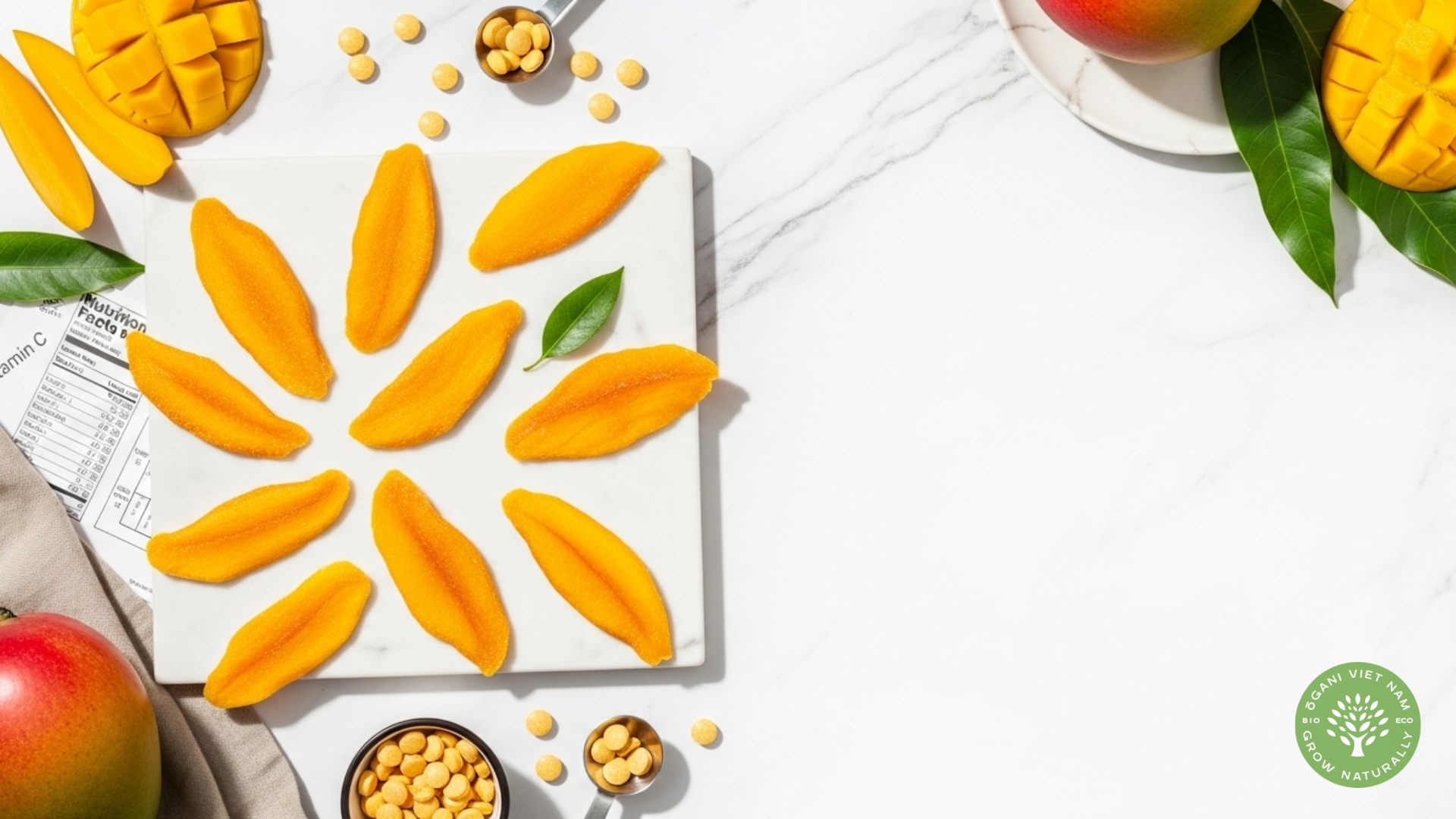Nutrition Dried Mango: Complete Health Benefits & Facts Guide
Nutrition dried mango offers a concentrated source of essential vitamins, minerals, and antioxidants, making it a popular healthy snack choice. While dried mangoes retain most nutritional benefits of fresh fruit, they also contain higher sugar concentrations and calories per serving.
At Ogani VN, we’ve seen countless customers discover the remarkable nutritional profile of dried mango. This golden tropical treat isn’t just delicious—it’s packed with vitamin C, vitamin A, fiber, and potassium that can support your daily wellness goals. However, understanding both the benefits and potential downsides helps you make informed choices about incorporating dried mango into your diet.
Nutrition dried mango: essential facts and calories breakdown
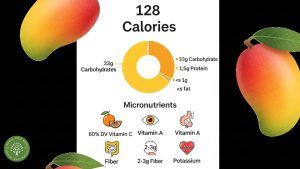
Nutrition dried mango delivers impressive nutrient density in compact servings. A typical 40-gram serving (about 7-8 pieces) contains approximately 128 calories, making it an energy-rich snack that fits well into active lifestyles.
The macronutrient breakdown shows dried mango contains primarily carbohydrates (around 33 grams per serving), with minimal fat content (less than 1 gram) and modest protein levels (about 1.5 grams). This composition makes dried mango an excellent pre-workout fuel or mid-afternoon energy boost.
Key micronutrients include vitamin C (providing roughly 60% of daily recommended intake), vitamin A (supporting eye health), and folate (essential for cellular function). The dehydration process concentrates these nutrients, meaning you get more vitamins per gram compared to fresh mango.
Dried mango also provides dietary fiber (approximately 2-3 grams per serving), which supports digestive health and helps maintain steady blood sugar levels. The natural sugar content, primarily fructose, ranges from 25-30 grams per serving depending on processing methods.
How nutrition dried mango supports your health daily
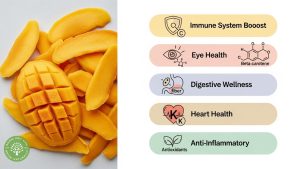
Regular consumption of dried mango can significantly boost your immune system function. The high vitamin C content acts as a powerful antioxidant, protecting cells from oxidative stress and supporting collagen production for healthy skin and joints.
Beta-carotene, which gives dried mango its vibrant orange color, converts to vitamin A in your body. This nutrient supports eye health, particularly night vision, and helps maintain healthy mucous membranes that act as barriers against infections.
The fiber content in nutrition dried mango promotes digestive wellness by encouraging beneficial gut bacteria growth and supporting regular bowel movements. Many of our Ogani VN customers report improved digestive comfort when they include dried mango in their daily routine.
Potassium in dried mango supports heart health and helps regulate blood pressure. This mineral works with sodium to maintain proper fluid balance and supports muscle function, including the heart muscle.
Dried mango contains various phytochemicals, including mangiferin and polyphenols, which demonstrate anti-inflammatory properties in research studies. These compounds may help reduce chronic inflammation linked to various health conditions.
Nutrition dried mango vs fresh mango: complete comparison
Fresh mango and dried mango share many nutritional similarities, but the dehydration process creates important differences. Fresh mango contains higher water content (about 85%), making it lower in calories per gram but also less nutrient-dense.
Vitamin and mineral concentrations
Nutrition dried mango typically contains 3-4 times more concentrated vitamins and minerals per weight compared to fresh mango. However, some heat-sensitive vitamins like vitamin C may decrease slightly during the drying process.
Fresh mango provides about 60 calories per 100 grams, while dried mango contains approximately 300-320 calories per 100 grams. This concentration means portion control becomes more important with dried varieties.
Sugar content differences
When comparing nutrition dried mango to fresh mango, the sugar content varies dramatically. Fresh mango contains natural sugars (about 14 grams per 100 grams), while the nutrition dried mango profile shows significantly concentrated sugars (65-70 grams per 100 grams). Some commercial dried mangoes also include added sugars, further increasing the total sugar content in dried mango nutrition.
The glycemic impact differs as well. Fresh mango has a moderate glycemic index, while nutrition dried mango can cause faster blood sugar spikes due to concentrated sugars and reduced fiber-to-sugar ratios.
Understanding potential downsides of dried mango
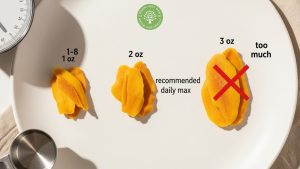
Despite its nutritional benefits, nutrition dried mango comes with several important considerations. The high calorie density means it’s easy to overconsume calories quickly. A small handful of dried mango pieces can contain as many calories as a full fresh mango.
Added sugars in many commercial dried mango products increase the total sugar content significantly. At Ogani VN, we always recommend checking ingredient labels and choosing varieties with no added sugars when possible.
The concentration process can reduce some water-soluble vitamins, and sulfur dioxide (used as a preservative in some brands) may cause reactions in sensitive individuals. Always look for sulfur-free options if you have sulfite sensitivities.
Dried mango’s sticky texture can contribute to dental issues if consumed frequently without proper oral hygiene. The concentrated sugars can feed harmful bacteria in your mouth, potentially leading to tooth decay.
Some people experience digestive discomfort when consuming large quantities of dried fruit due to the concentrated fiber and natural fruit sugars. Starting with small portions allows your digestive system to adjust gradually.
Maximizing nutrition dried mango benefits in your diet
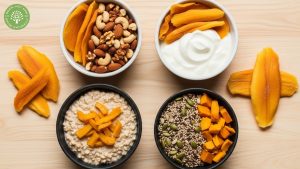
Portion control remains crucial when enjoying dried mango’s nutritional benefits. We recommend limiting servings to 1-2 ounces (28-56 grams) daily, which provides substantial nutrients without excessive calories or sugars.
Pairing dried mango with protein sources like nuts, seeds, or Greek yogurt can help slow sugar absorption and create more balanced blood sugar responses. This combination also increases satiety, making you feel full longer.
Use nutrition dried mango as a natural sweetener in homemade trail mixes, oatmeal, or smoothie bowls instead of processed sugars. The natural fruit sugars provide sweetness while contributing beneficial nutrients.
Consider dried mango as a pre-workout snack, when your body can effectively utilize the quick-acting carbohydrates for energy. The potassium content also supports muscle function during exercise.
For weight management goals, treat dried mango as you would any concentrated sweet treat—enjoy it mindfully and account for its calories in your daily intake. The fiber and nutrients make it a better choice than many processed snacks.
Frequently Asked Questions
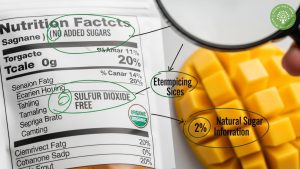
Q: How much dried mango should I eat daily? A: We recommend limiting intake to 1-2 ounces (about 15-20 pieces) per day to balance nutritional benefits with calorie and sugar considerations.
Q: Is dried mango better than fresh mango nutritionally? A: Both offer excellent nutrition, but fresh mango provides more water and fewer concentrated sugars, while dried mango offers more concentrated vitamins and minerals per gram.
Q: Can diabetics eat dried mango? A: Diabetics should consume dried mango cautiously due to its concentrated natural sugars. Consult with healthcare providers and monitor blood glucose responses when including it in meal plans.
Q: Does dried mango help with constipation? A: The fiber content in dried mango can support digestive regularity, but adequate water intake is essential since dried fruit can be dehydrating.
Q: Are there any preservatives I should avoid in dried mango? A: Look for sulfur dioxide-free options if you have sulfite sensitivities. Choose organic varieties when possible to minimize exposure to pesticide residues.
Your next steps to enjoying dried mango healthfully
Nutrition dried mango provides an impressive array of vitamins, minerals, and antioxidants in a convenient, shelf-stable form. While it offers concentrated nutrition that can support immune function, eye health, and digestive wellness, mindful consumption remains key due to its high calorie and sugar content.
At Ogani VN, we believe informed choices lead to better health outcomes. Whether you’re looking for a nutritious snack, natural sweetener alternative, or pre-workout fuel, dried mango can be a valuable addition to a balanced diet when consumed thoughtfully.
Ready to experience premium quality dried mango with optimal nutritional value? Explore our carefully selected collection of organic, no-added-sugar dried mango varieties at Ogani VN, where we prioritize both taste and nutrition in every product we offer.
Read more:
- Dried Mango Nutrition Facts: Complete Guide To Calories, Benefits & Health Impact
- Best Dried Mango No Sugar Added: Premium Quality Guide
- Calories In Dried Mango No Sugar Added: Complete Nutrition Guide
- Dried Mango Nutritional Value: Complete Health Guide
- Nutrition Dried Mango: Complete Health Benefits & Facts Guide


